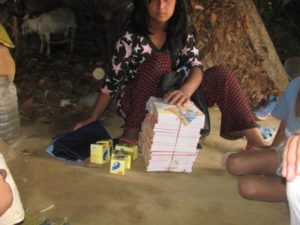This is the history of Dolly*, a 14 year-old girl from a remote area in Lalitpur District, Nepal. Dolly grew up in an abusive and violent family environment. Her father is an alcoholic who repeatedly abused her emotionally and physically. Dolly and her mom decided to run away to start a new life. However, Dolly faced emotional challenges when adapting to a new environment, these difficulties prevented her from developing resilience.
Developing Resilience in Dolly’s life
 Once Dolly and her mom settled down in a new community she was enrolled in the local school, there Dolly had a tough time trying to blend in. She was constantly bullied by her classmates, mainly because of her past –her father was an alcoholic that remarried another women. Dolly was also ostracized, this led her to quit school and stay at home instead. Dolly desperately needed a supportive and loving family/school environment to help her to set in place coping mechanisms to overcome criticism. Fortunately, Dolly was supported by her mother and a team of social workers from CWISH. The counselling sessions Dolly attended at CWISH helped her to open up and seek out support. After several sessions she decided that she was ready to resume her studies but in a different school.
Once Dolly and her mom settled down in a new community she was enrolled in the local school, there Dolly had a tough time trying to blend in. She was constantly bullied by her classmates, mainly because of her past –her father was an alcoholic that remarried another women. Dolly was also ostracized, this led her to quit school and stay at home instead. Dolly desperately needed a supportive and loving family/school environment to help her to set in place coping mechanisms to overcome criticism. Fortunately, Dolly was supported by her mother and a team of social workers from CWISH. The counselling sessions Dolly attended at CWISH helped her to open up and seek out support. After several sessions she decided that she was ready to resume her studies but in a different school.
Dolly knows now that she doesn’t have to go through tough times alone, she can rely on her mother and the team at CWISH to share her fears and difficulties. The life-story of Dolly helped me to understand that vulnerable children in order to develop resilience, need a positive environment to be able to develop the confidence required to share negative experiences and feelings. In this positive environment street-connected and vulnerable children should feel safe and loved, receive positive feedback and have access to information related to their rights, services and legal processes in their countries.
*name changed to protect identity.